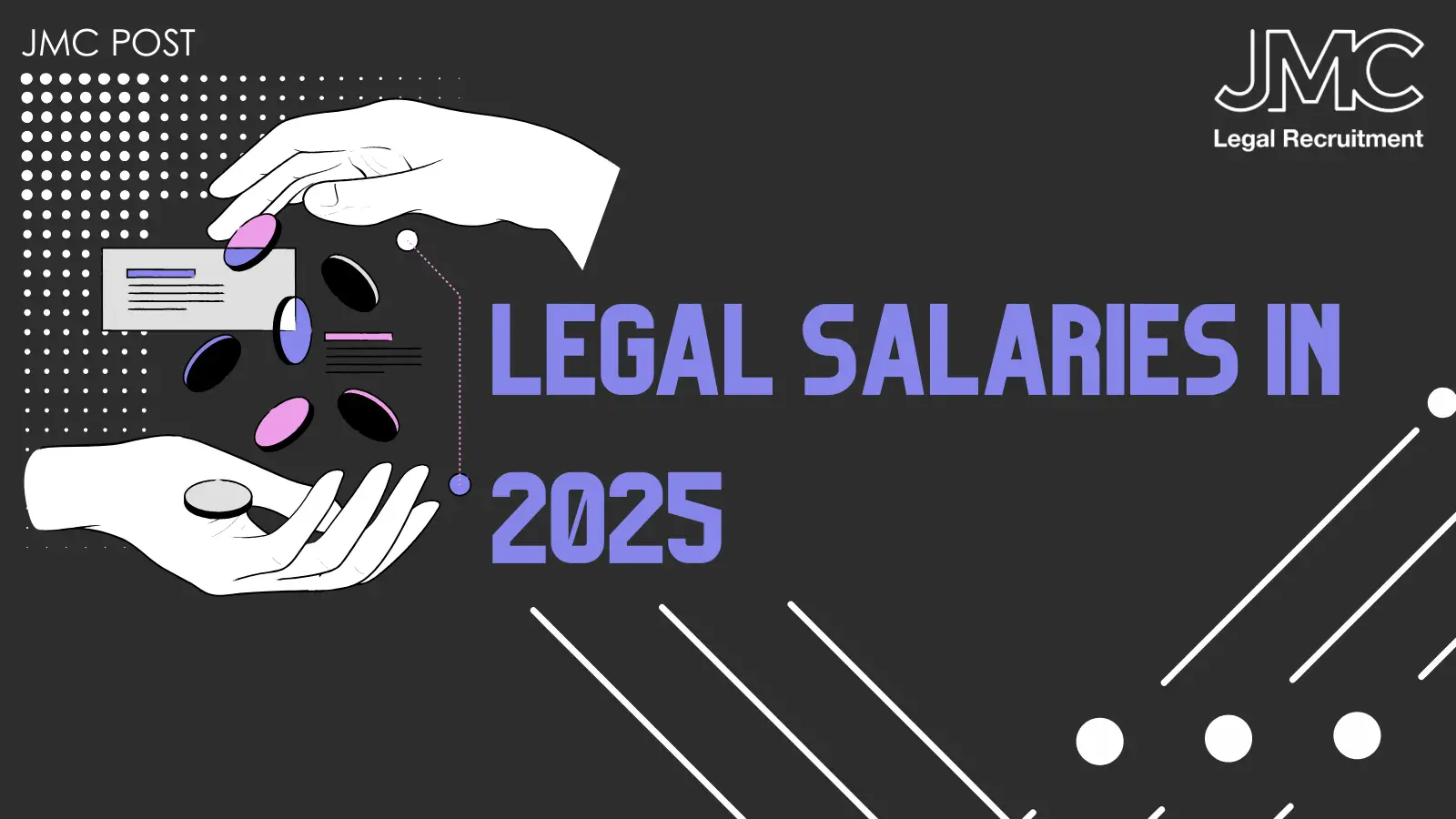
Legal Salaries in 2025
09 Jul, 20255 minutes
Legal Salaries in 2025: A Candid Look at What’s Really Going On
By Jason Connolly, CEO of JMC Legal Recruitment
Over the last ten years, and especially since the pandemic, legal salaries have changed beyond recognition. What used to be a fairly linear, almost predictable process has become something far more nuanced and, in many ways, more confusing. If you're a lawyer in 2025 trying to make sense of what you're worth, you're not alone.
Let’s unpack what’s really happening behind closed doors when it comes to pay in today’s legal market.
📉 The Death of the Classic PQE Salary Banding
Go back ten years, or even five, and most firms followed a pretty strict PQE-based salary structure. You’d have clear scales: NQs got X, 1–2 PQE got Y, 3+ PQE got Z, and so on. It was neat. It was tidy. It was, frankly, limiting.
On the one hand, this structure offered clarity. Everyone knew where they stood. But the big issue? It assumed all lawyers of the same PQE were equal. And anyone who’s spent even a day in recruitment, or inside a firm, knows that’s simply not the case.
Two lawyers at the same PQE can be worlds apart in terms of performance, contribution, and commercial awareness. Yet, under this system, they’d often be paid the same. That’s a surefire way to make your top talent feel underappreciated (and drive them elsewhere.)
🔁 Merit Is the New Metric
In the past few years, especially in top 200 firms, we’ve seen a shift. Yes, there’s still structure at the junior levels (NQs, 1PQE), but once you hit the 2–3 year mark, the old PQE system starts to fall away. Now, more and more firms are looking at:
- Your billings
- Your contribution to the team
- Your client development
- Your wider impact on the firm
This move towards merit-based pay is positive for ambitious lawyers, but it also creates ambiguity. Gone is the salary table you could neatly slot yourself into. In its place is a more complex, holistic assessment of value.
📍 Why Location (Still) Matters
Let’s talk geography. The salary conversation in London is completely different to the rest of the UK, and even within London, there are countless submarkets.
Outside London
You’ll typically find four categories of firms:
- Boutiques: These vary a lot. Some are high street, some are specialist powerhouses. Generally, though, they pay the least.
- Regional Firms: A step up in structure and usually a bit better on pay.
- Premium Regional / Top 200 Firms: These often have more structure again but still diverge significantly after 3+ PQE.
- National/Top 50 Firms: Usually with clearer internal bandings and more defined progression.
Even in these structured firms, the moment you move into mid-senior roles, the disparity increases. I recently heard of a US firm where partner salaries varied by 250%. That just shows how much individual performance now drives earnings.
🏙️ London: A Market of Many Markets
In London, you’ve got everything from boutique litigation firms, to West End practices, to City powerhouses and elite US firms. Each plays by different rules.
- Boutique firms can offer top-tier work, sometimes better than Magic Circle firms, but may pay less or reward differently.
- West End practicesoften pay lower base salaries than City firms but can offer:
- Greater autonomy
- Closer work with partners
- More entrepreneurial practice areas (think media, art, music, TV)
- Merit-driven career progression
If you’re a rainmaker or someone who thrives outside of rigid structures, these firms can offer an amazing career trajectory.
But it’s not just about money, it’s also about fit. Jumping from a Legal 500 firm in Norwich to a top-tier London firm might look like a salary upgrade, but culturally and commercially, it can be a big leap. Sometimes too big.
❌ Why Salary Surveys Miss the Mark
Here’s a hot take: salary surveys are often not worth the paper they’re printed on.
We rarely produce them anymore. Why? Because salaries shift so fast, especially in the legal sector, that any survey is outdated almost as soon as it’s published.
It’s far more effective to speak to a competent, well-informed recruiter, someone who lives and breathes the market. They’ll help you navigate the nuances that no survey can capture.
🧩 So, How Do You Know If You’re Paid Correctly?
It starts with self-awareness. Ask yourself:
- What are you billing?
- How much time does that take?
- Are you managing people or contributing strategically?
- Where is your work coming from? Is it fed to you or are you winning it?
- Are you involved in team-building, mentoring, training?
Especially for lawyers 5+ PQE, you can’t just look at your number. You’ve got to deconstruct your role. A £300k billing figure might sound great, but if it’s draining you or taking 80 hours a week, that’s a red flag. Or it might be exactly what a higher-paying firm wants.
🔁 Think in Years, Not Months
Your salary today matters but your trajectory matters more. I always tell candidates to build a 5 to 10-year plan. Where do you want to end up? And does your current role help you get there?
Are you just “making do” with a decent salary, or are you on a path that excites you, professionally and financially?
If not, something needs to shift.
🏁 Final Thoughts: Take Control of Your Worth
Most importantly, something you need to understand is that in 2025, you’ll be paid what your firm thinks you’re worth. Full stop.
The key is making sure you agree with that valuation and if you don’t, being proactive enough to do something about it.
Whether that means renegotiating, reassessing, or relaunching your career somewhere new, the ball is in your court. But don’t go it alone. Speak to someone who knows the market and sees what you might not.
At JMC, we’re not just filling jobs, we’re helping people build careers. And that starts with understanding your value in this new era of legal salaries.
Related Articles:
[Which Area of Law Pays Best?]
[Adapting to Competitive Market]
[2025 Trends in Partner Hiring and Lateral Moves]



